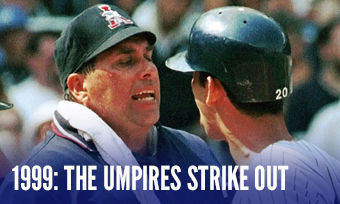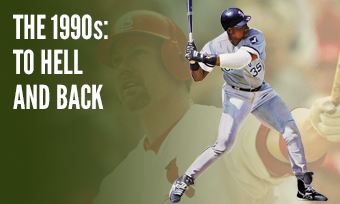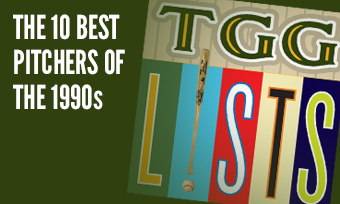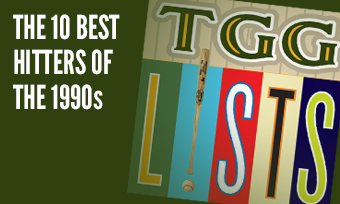The Yearly Reader
Leaders and Honors, 1999
Our list of baseball’s top 10 hitters and pitchers in both the American League and National League for the 1999 baseball season, as well as the awards and honors given to the game’s top achievers of the year.
The National League’s Top 10 Hitters, 1999
Bold type in brick red indicates league leader.
1. Jeff Bagwell, Houston
Key Numbers: 162 games, .304 average, 143 runs, 171 hits, 35 doubles, 42 home runs, 126 RBIs, 149 walks, 11 hit-by-pitches, 30 stolen bases.
Bagwell tore up the spacious Astrodome (in its final year as the Astros’ home) like he was already playing in homer-happy Enron Field; he saved his most prodigious power for Chicago, connecting for three homers on April 21 at Wrigley Field—and again on June 9 at New Comiskey Park in an interleague game against the White Sox.
2. Mark McGwire, St. Louis
Key Numbers: .278 average, 118 runs, 65 home runs, 147 RBIs, 133 walks, 21 intentional walks.
After a “quiet” start to the year, McGwire went into overdrive in pursuit of his own home run record of the year before, smashing 42 balls over the fence from July 1 on.
3. Larry Walker, Colorado
Key Numbers: 127 games, .379 average, 108 runs, 166 hits, 26 doubles, 37 home runs, 115 RBIs, 12 hit-by-pitches, 11 stolen bases, .458 on-base percentage, .710 slugging percentage.
Walker thanked Coors Field (where he hit an astonishing .461) for becoming the first player in nearly 70 years to bat over .360 in three straight seasons.
4. Chipper Jones, Atlanta
Key Numbers: .319 average, 116 runs, 181 hits, 41 doubles, 45 home runs, 110 RBIs, 126 walks, 25 stolen bases, 20 grounded into double plays.
Jones won near-unanimous NL MVP honors principally for the abuse he heaped upon the divisional rival Mets—hitting .400 with seven home runs in 12 games against them.
5. Bobby Abreu, Philadelphia
Key Numbers: .335 average, 118 runs, 183 hits, 35 doubles, 11 triples, 20 home runs, 93 RBIs, 109 walks, 27 stolen bases.
Springing into peak form, the 25-year-old Venezuelan began a streak of seven straight seasons in which he collected at least 20 homers, 20 steals, 100 walks and almost 100 runs (he scored 99 in 2003).
6. Sammy Sosa, Chicago
Key Numbers: 162 games, .288 average, 114 runs, 180 hits, 63 home runs, 141 RBIs, 171 strikeouts.
While Sosa cooled in his attempt to surpass Mark McGwire’s 70 homers, the new race was whether he could hit more round-trippers than his Cubs could win games. (He fell four home runs short.)
7. Carl Everett, Houston
Key Numbers: 123 games, .325 average, 86 runs, 33 doubles, 25 home runs, 108 RBIs, 27 stolen bases.
What did the Cubs do to get Everett so steamed? In 11 games against Chicago, the breakout Astro batted .522 (24-for-46) and belted six home runs with 20 RBIs.
8. Brian Giles, Pittsburgh
Key Numbers: .315 average, 109 runs, 33 doubles, 39 home runs, 115 RBIs, 95 walks.
Giles was considered excess overflow material in ultra-potent Cleveland; he was thus jettisoned to Pittsburgh, where he became the Pirates’ first big-time slugger since Barry Bonds.
9. Luis Gonzalez, Arizona
Key Numbers: .336 average, 112 runs, 206 hits, 45 doubles, 26 home runs, 111 RBIs.
Love at first sight: After nine years with sound but modest numbers, Gonzalez debuted with the Diamondbacks and won the fans over by hitting safely in 34 of his first 35 games—including an Arizona-record 30 straight.
10. Vladimir Guerrero, Montreal
Key Numbers: .316 average, 102 runs, 193 hits, 37 doubles, 5 triples, 42 home runs, 131 RBIs, 14 stolen bases.
The quiet, free-swinging Guerrero became an emerging tower of power within the crumbling major league slum of Montreal; his 31-game hitting streak was the majors’ longest in 12 years.
The American League’s Top 10 Hitters, 1999
1. Manny Ramirez, Cleveland
Key Numbers: .333 average, 131 runs, 174 hits, 34 doubles, 44 home runs, 165 RBIs, 96 walks, 13 hit-by-pitches, .663 slugging percentage.
Not since Jimmie Foxx in 1938 had anyone punched in as many runs as Ramirez did for Cleveland—the first team since the 1950 Red Sox to score over 1,000 runs.
2. Roberto Alomar, Cleveland
Key Numbers: .323 average, 138 runs, 182 hits, 40 doubles, 24 home runs, 120 RBIs, 99 walks, 37 stolen bases, 13 sacrifice flies.
During what was arguably the peak of the Steroid Era, Alomar was one of five Indians to score over 100 runs while setting personal-best totals in runs, home runs, RBIs and walks.
3. Rafael Palmeiro, Texas
Key Numbers: .324 average, 96 runs, 183 hits, 30 doubles, 47 home runs, 148 RBIs, 97 walks.
Trading towns with Will Clark—who innocently enraged Palmeiro for taking his spot five years earlier—the ex-Oriole generated the most awesome numbers of his career.
4. Shawn Green, Toronto
Key Numbers: .309 average, 134 runs, 190 hits, 45 doubles, 42 home runs, 123 RBIs, 11 hit-by-pitches, 20 stolen bases.
Flourishing without Cito Gaston after the two conflicted over hitting styles, Green was now likely to leave via free agency as Gaston was returning as the Blue Jays’ hitting coach.
5. Derek Jeter, New York
Key Numbers: .349 average, 134 runs, 219 hits, 37 doubles, 9 triples, 24 home runs, 102 RBIs, 91 walks, 12 hit-by-pitches, 19 stolen bases.
The revered Yankees shortstop was never better offensively than in 1999, setting career marks in virtually every major offensive category.
6. Ken Griffey Jr., Seattle
Key Numbers: .285 average, 123 runs, 173 hits, 26 doubles, 48 home runs, 134 RBIs, 91 walks, 17 intentional walks, 24 stolen bases.
Griffey had one last prodigious run in Seattle before longing to be closer to his Florida home—and longing to bring the newly-opened Safeco Field’s fences inward; when he failed to convince the Mariners of the latter, he enacted on the former and took his act elsewhere.
7. Alex Rodriguez, Seattle
Key Numbers: 129 games, .285 average, 110 runs, 25 doubles, 42 home runs, 111 RBIs, 21 stolen bases.
Like Griffey, Rodriguez wasn’t happy to have the bandboxed Kingdome taken away from him; he hit a relatively banal .276 (but with 13 homers) in 42 games at Safeco Field.
8. Nomar Garciaparra, Boston
Key Numbers: 135 games, .357 average, 103 runs, 190 hits, 42 doubles, 27 home runs, 104 RBIs, 14 stolen bases.
Boston’s young hotshot hitter won his first of two consecutive batting crowns, while becoming the fourth Red Sock to knock in 10 runs in a game on May 10 against Seattle.
9. Juan Gonzalez, Texas
Key Numbers: .326 average, 114 runs, 183 hits, 36 doubles, 39 home runs, 128 RBIs.
‘Juan Gone’ was ‘Juan Almost-Gone’ on July 3 when he tied a major league record with three sacrifice flies against the Mariners.
10. Bernie Williams, New York
Key Numbers: .342 average, 116 runs, 202 hits, 28 doubles, 6 triples, 25 home runs, 115 RBIs, 100 walks, 17 intentional walks.
The Yankees were so convinced they would lose Williams to free agency—and worst yet, to archrival Boston—that they nearly signed Albert Belle as a replacement; they were thus relieved that he accepted the hometown discount to stay in pinstripes and record his highest career batting average.
The National League’s Top 10 Pitchers, 1999
1. Mike Hampton, Houston
Key Numbers: 2.90 ERA, 22 wins, 4 losses, .846 win percentage, 34 starts, 239 innings, 101 walks, 36 grounded into double plays.
The southpaw excelled for the Astros on both the mound and at the plate; he hit .311 with three doubles and three triples over 74 at-bats.
2. Kevin Brown, Los Angeles
Key Numbers: 3.00 ERA, 18 wins, 9 losses, 35 starts, 252.1 innings.
Aside from being baseball’s richest ($105 million) player, Brown threw as if he was just happy to settle in at Los Angeles after playing the past five years among four different teams.
3. Randy Johnson, Arizona
Key Numbers: 2.48 ERA, 17 wins, 9 losses, 35 starts, 12 complete games, 271.2 innings, 364 strikeouts, 42 stolen bases allowed, 22 caught stealing/picked off.
Johnson might have won 20 in his first full NL year had his Arizona teammates not hit .054 during a four-game stretch in which he pitched brilliantly.
4. Kevin Millwood, Atlanta
Key Numbers: 2.68 ERA, 18 wins, 7 losses, .720 win percentage, 33 starts, 228 innings.
Considered the fifth wheel in the Braves’ rotation, the 24-year-old Millwood produced numbers that arguably made him the year’s best pitcher in Atlanta.
5. Billy Wagner, Houston
Key Numbers: 1.57 ERA, 4 wins, 1 loss, 39 saves, 3 blown saves, 66 appearances, 74.2 innings.
Mixing a 100-MPH fastball with a slider reportedly taught to him by Randy Johnson, Wagner became virtually unhittable—as proven by a .135 opposing batting average.
6. Greg Maddux, Atlanta
Key Numbers: 3.57 ERA, 19 wins, 9 losses, .679 win percentage, 33 starts, 219.1 innings, 37 walks, 21 stolen bases allowed.
Mad Dog blamed his highest season ERA since 1987 on a refined strike zone that cut at his ability to nip the corners, but bad eyes may have really been the culprit; midseason laser eye surgery led to a better second half and nearly got him back to 20-win territory.
7. John Smoltz, Atlanta
Key Numbers: 3.19 ERA, 11 wins, 8 losses, 29 starts, 186.1 innings, 40 walks.
Smoltz somehow continued to suck it up as an increasingly bad elbow ate at his pain threshold.
8. Jose Lima, Houston
Key Numbers: 3.58 ERA, 21 wins, 10 losses, .677 win percentage, 35 starts, 246.1 innings, 44 walks.
The Astrodome was certainly Lima’s best friend, allowing just seven of his 30 home runs at the enclosed facility; with its closure, Lima would have a fateful date with harsh reality and the far more hitter-friendly Enron Field in 2000.
9. Omar Daal, Arizona
Key Numbers: 3.65 ERA, 16 wins, 9 losses, 32 starts, 214.2 innings, 7 stolen bases allowed, 14 caught stealing/picked off.
A much improved roster surrounded Daal and gave him greater run support—and thus, a much better record—even as his ERA rose by nearly a run.
10. Trevor Hoffman, San Diego
Key Numbers: 2.14 ERA, 2 wins, 3 losses, 40 saves, 3 blown saves, 64 appearances, 67.1 innings, 8 grounded into double plays.
After blowing his third save of the year on June 2, Hoffman successfully converted his remaining 31 opportunities of the year with a 0.96 ERA.
The American League’s Top 10 Pitchers, 1999
1. Pedro Martinez, Boston
Key Numbers: 2.07 ERA, 23 wins, 4 losses, .852 win percentage, 29 starts, 213.1 innings, 37 walks, 313 strikeouts, 21 stolen bases allowed.
Martinez was simply in another world, winning the AL ERA crown by a wider margin than any other player in history (he’d make it even wider a year later). He lost a tight MVP vote to Ivan Rodriguez despite drawing one more first-place vote.
2. Mike Mussina, Baltimore
Key Numbers: 3.50 ERA, 18 wins, 7 losses, .720 win percentage, 31 starts, 203.1 innings, 23 grounded into double plays.
The reliable ace didn’t need so much support—he got it anyway, at 6.5 runs per start—and he continued to master hitter-friendly Oriole Park at Camden Yards, winning 10 games there with a 3.22 ERA.
3. Jamie Moyer, Seattle
Key Numbers: 3.87 ERA, 14 wins, 8 losses, 32 starts, 228 innings, 48 walks, 9 stolen bases allowed, 12 caught stealing/picked off, 25 grounded into double plays.
After a rocky first 10 years, Moyer came to Seattle and, at age 36, continued to cement his place in the game with a pitching arsenal that had everything but velocity (his fastball maxed out at 85).
4. Bartolo Colon, Cleveland
Key Numbers: 3.95 ERA, 18 wins, 5 losses, .783 win percentage, 32 starts, 205 innings.
The Indians’ young gun escaped the first half with a 7-2 record—and 5.35 ERA; after the All-Star Break, he was 11-3 with a 2.60 figure.
5. Mariano Rivera, New York
Key Numbers: 1.83 ERA, 4 wins, 3 losses, 45 saves, 4 blown saves, 66 innings, 69 innings.
The Yankees’ star closer finished the year with a career-high string of 31.2 consecutive scoreless innings—and that didn’t include an additional 12 thrown in the postseason to follow.
6. Roberto Hernandez, Tampa Bay
Key Numbers: 3.07 ERA, 2 wins, 3 losses, 43 saves, 4 blown saves, 72 appearances, 73.1 innings.
Hernandez’s 43 saves were all the more impressive when you consider he did it for a Tampa Bay team that won only 69 games.
7. Jose Rosado, Kansas City
Key Numbers: 3.85 ERA, 10 wins, 14 losses, 33 starts, 208 innings.
The 24-year-old southpaw made his second All-Star appearance and proved stingy for the times despite underwhelming numbers; his career would be over just a year later with a substantial tear of his rotator cuff.
8. John Wetteland, Texas
Key Numbers: 3.68 ERA, 4 wins, 4 losses, 43 saves, 7 blown saves, 62 appearances, 66 innings.
With his final two saves of the season, Wetteland edged Dennis Eckersley for the most saves (295) during the 1990s.
9. David Cone, New York
Key Numbers: 3.44 ERA, 12 wins, 9 losses, 31 starts, 193.1 innings, 11 hit-by-pitches, 22 stolen bases allowed.
Strangely, Cone was 2-5 with a 4.82 ERA after throwing his perfect game on July 18 against Montreal. It wasn’t because he was overworked trying to achieve perfection; he threw just 88 pitches in the first no-hitter thrown in an interleague game.
10. Mike Sirotka, Chicago
Key Numbers: 4.00 ERA, 11 wins, 13 losses, 32 starts, 209 innings.
The only member of the White Sox’ rotation with a sub-5.00 ERA, Sirotka staved off a bad finish (5.22 ERA after July 15) to avoid joining the crowd.









